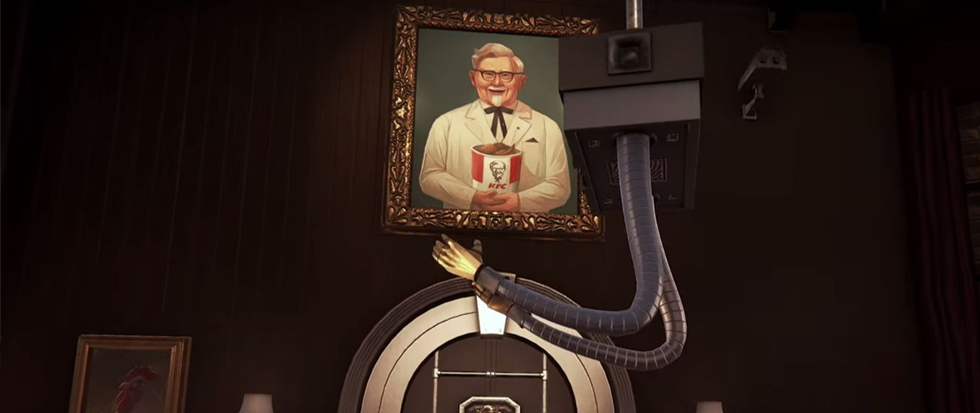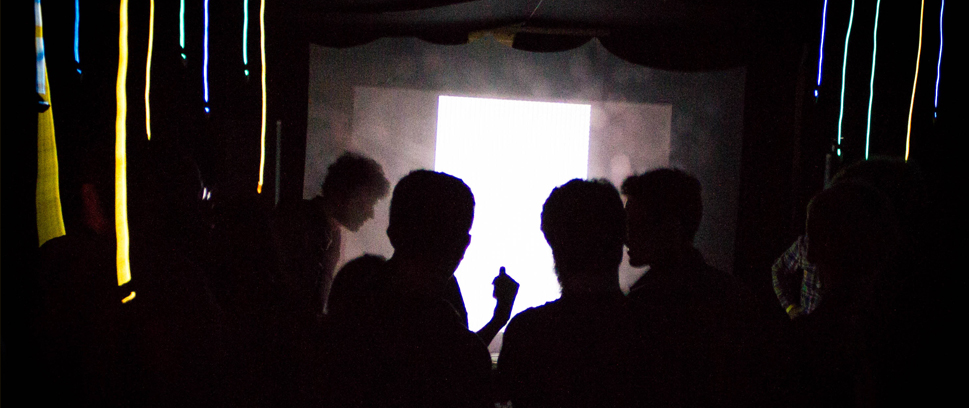
The Unspoken Horrors of KFC’s Virtual Reality Game
If there’s anything I learned about Colonel Sanders this week, it’s that he’s in desperate need of lozenges. Yes, the KFC mascot and founder is now the omnipresent voice of a virtual reality videogame called The Hard Way, a virtual escape room by the fast food chain that trains potential cooks in the fine art of inspecting, rinsing, breading, racking and pressure frying its signature fried chicken. All within the comforts of his luxurious but ominous virtual lodge, as the Colonel wryly informs the player that he will be watching your every move.
He cackles diabolically. Followed by a loud wheezing from a sudden and violent coughing fit, which broke his façade as a nefarious restaurateur for a few seconds.
“Oh uhm, excuse me,” he muttered.
The ensuring experience is nothing short of bizarre, but at least it is charmingly so. The short VR session, which is to be part of an actual training program for new cooks, is set in a room full of kitschy kitchen utensils and KFC paraphernalia: a grandiose painting of the Colonel himself, a framed picture of a chicken, a chandelier with silver chicken wings and a rubber chicken on a countertop, among many others. It would seem almost homely, if not for the fact that players are probably trapped in this kooky lair against their will. Soon after, a pair of robotic hands shoots out from the Colonel’s portrait—not to grab the chicken, mind you, but to demonstrate how to handle the chicken; in the words of Colonel Sanders himself, those delicious chunks of meat are only for your “supple, human hands” to bread. I wonder if the real Colonel Sanders was ever as eerily obsessed about chicken.
The oddball humor of The Hard Way feels appealing because of how self-aware and ostensibly unpretentious the corporate giant is. Most brands, of course, will shrink from portraying their founder in such a chirpily villainous manner, but KFC seemed to have embraced this madcap persona. According to John Minori, the experience design lead at the creative agency W+K Lodge which developed the virtual reality game, the Colonel himself was definitely very particular about his signature dish in the past. “We know he’s obsessive about the process,” said Minori in an interview with Adweek. “That led us down the path of what if he locked you in a room and you couldn’t escape unless you did it his way the hard way?” The entire experience is so delightful, that knowing that only KFC cooks and personnel will get to try this game—since there are no plans to release it to the public just yet—makes me contemplate joining the fast food chain as a cook for a few brief moments.
And that, instead of the dystopian, unsettling vibe of The Hard Way, is what makes this entire experience horrifying.
Virtual reality is inherently intimate. In the absence of screens and avatars like those of movies and videogames, it enhances the presence of its participants within its environment and heightens their emotional states. It makes them feel as if they are right there, in the flesh. That’s why being shot at with a gun in virtual reality may feel genuinely painful, much like the phantom limb syndrome in which amputees felt sensations in a missing limb. That’s why sexual harassment in virtual reality is so much more traumatizing, such as this instance in which a harasser decided to virtually grope and chase another female participant, much to her revulsion and fear.

KFC’s The Hard Way symbolizes the growing intimacy between brands and consumers through virtual reality. It may fuel intense consumerism; it may influence and redefine social needs; and it may grant brands too much power and help us forget about their transgressions—KFC had been accused of underpaying its employees before, and the irony of trapping potential employees in a virtual room until they do their job properly is palpable. It may lead us to embracing such content wholeheartedly when virtual reality headsets eventually become so affordable that everyone can own their own set.
And because this intimacy is creeping up on us, we may never know of its influence and prevalence until it becomes too commonplace. The Oculus Rift is already collecting our personal information such as location and eliciting a lot of data-mining concerns.
And yet, a part of me seems willing to submit to this intrusion, accepting it as a peculiarity of living in this technologically-advanced era. I still like The Hard Way, and I still want to try it.





